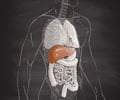Western diet causes inflammation of liver cells which can be treated with probiotics, as it facilitates growth of bacteria that reduces liver damage.
- A typical western diet is high in fat and sugar and causes inflammation of liver cells.
- The diet changes the gut microbiota and the bile acid profile.
- Probiotics can be used to prevent and treat hepatic inflammation and progression of advanced liver diseases such as cancer.
"We know the transition from steatosis, or fatty liver, to steatohepatitis (inflammation in the fatty liver) plays a crucial role in liver injury and carcinogenesis. Because the liver receives 70% of its blood supply from the intestine, it is important to understand how the gut contributes to liver disease development," explained lead investigator Yu-Jui Yvonne Wan, PhD, Professor and Vice Chair of the Department of Pathology and Laboratory Medicine at UC Davis Health.
Western Diet Pattern Induces Liver Inflammation
Dr. Wan and her team used mice that lacked farnesoid x receptor (FXR), a bile acid receptor. The FXR-deficient mouse model an important tool to better understand the role of diet and inflammation in the development of liver diseases as patients with cirrhosis or liver cancer also have low FXR levels.Previously done studies have shown that FXR-deficient mice spontaneously develop steatohepatitis and liver tumors even when they are fed a normal rodent diet.
In the study, wild-type and FXR-deficient mice were either fed with a control diet or a western diet for 10 months. Both Western diet-fed mice and control diet-fed FXR KO mice developed steatosis or abnormal retention of lipids within the cells. Steatosis was more severe in males than females.
Only the FXR-deficient male mice had massive lymphocyte and neutrophil infiltration in the liver, which means that white blood cells have left the blood stream and migrated into a tumor.
"These studies show that a Western diet intake and FXR inactivation also increased hepatic inflammatory signaling, with a combined enhanced effect," Dr. Wan said.
Response To Antibiotics
A combination of ampicillin, neomycin, metronidazole, and vancomycin were introduced to reduce inflammation. Based on the diets the mice received, the effect of antibiotics was varied.But the FXR-deficient mice had more hepatic inflammation as the antibiotics altered the gut microbiota.
Many inflammatory genes had higher expression levels in Western diet than control diet-fed FXR KO mice after antibiotic treatment. Liver cells synthesize gut bacteria and bile acids which help in lipid and sugar homeostasis as well as inflammatory response.
Dr. Wan said, "Gut and liver health are linked. It is clear that microbial imbalance and dysregulated bile acid synthesis are inseparable, and they jointly contribute to hepatic inflammation via the gut-liver axis.”
The reduced hepatic inflammation by antibiotics was accompanied by decreased free and conjugated secondary bile acids in a gender-dependent manner.
Altered Gut Bacteria Composition
On analyzing the gut bacteria composition, investigators found that Proteobacteria and Bacteroidetes persisted after the broad-spectrum antibiotic treatment in the Western diet-fed FXR KO mice.But the antibiotic polymyxin B, increased Firmicutes and decreased Proteobacteria, as well as, hepatic inflammation in Western diet-fed FXR KO male mice.
“Gut microbiota and bile acid profiles may explain gender difference in liver disease as liver cancer incidence is much higher in men than women” noted Dr. Wan.
The adverse effects of the Western diet might be due to the persistence of Proteobacteria which causes inflammation and the reduced levels of anti-inflammatory Firmicutes in the gut.
After the treatment of antibiotics, gut bacteria which produce bile acid can directly be eliminated which also causes changes in the bile acid composition. The study sheds light on the effect of a high fat high sugar diet which destroys liver cells. Also, the treatment of antibiotics to reduce the inflammation in the liver cells acts in a gender-based manner and destroys bacteria which help in bile acid production.
Probiotics Can Be Useful in Liver Disease
Maintaining a healthy gut is crucial for the treatment of liver steatosis. The use of antibiotics to eliminate infection can ultimately destroy bacteria which helps synthesize bile acids. So, introducing probiotics can help maintain a varied population of gut bacteria that may help reduce liver inflammation."Our results suggest that probiotics and FXR agonists hold promise for the prevention and treatment of hepatic inflammation and progression into advanced liver diseases such as cancer," claims Dr. Wan.
Reference:
- Yu-Jui Yvonne Wan et al., Western Diet–Induced Dysbiosis in Farnesoid X Receptor Knockout Mice Causes Persistent Hepatic Inflammation after Antibiotic Treatment, The American Journal Of Pathology, http://dx.doi.org/10.1016/j.ajpath.2017.04.019.
















